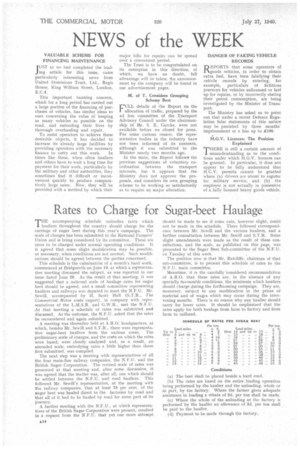Rates to Charge for Sugar-beet Haulage
Page 16

If you've noticed an error in this article please click here to report it so we can fix it.
THE accompanying schedule embodies rates which hauliers throughout the country should charge for the carriage of sugar beet during this year's campaign. The scale of charges has been submitted to the National Farmers' Union and is being considered by its committee. These are rates to he charged under normal operating conditions. It is agreed that some slight modification may be possible, or necessary, when conditions are not normal. Such modifications should be agreed between the parties concerned.
This schedule is the culmination of a month's hard work, commenced at Bridgnorth on June 19, at which a represents. tive meeting discussed the subject, as was reported in our issue dated June 29. As the result of that meeting, it was suggested that a national scale of haulage rates for sugar beet should be agreed, and a small committee representing hauliers and railways was deputed to meet the N.F.U. Mr. Sewill, accompanied by H. Scott Hall (S.T.R., The Commercial Motor costs expert), in company with representatives of the L.M.S.R. and G.W.R., met the N.F.U. At that meeting a schedule of rates was submitted and discussed. As the outcome, the N.F.U. asked that the rates be reconsidered and again submitted.
A meeting was thereafter held at A.R.O. headquarters, at which, besides Mr. Sewill and S,T.R., there were representative sugar-beet hauliers from the various areas. The preliminary scale of charges, and the costs on which the rates were based, were closely analysed and, as a result, an amended scale, embodying rates a little higher than those first submitted, was compiled. The next step was a meeting with representatives of all the four main-line railway companies, the N.F.U. and the British Sugar Corporation. The revised scale of rates was presented at that meeting and, after some discussion, it was agreed that the matter was, after all, one which should be settled between the N.F.U. and road hauliers. This followed Mr. Swill's representation, at the meeting with the railway companies, that at least 75 per cent, of the sugar beet was hauled direct to the factories by road and that all of it had to be hauled by road for some part of its journey. A further meeting with the N.F.U., at which representatives of the British Sugar Corporation were present, resulted in a request from the N.F.U. that yet one more attempt should be made to see if some cuts, however slight, could not be made in the schedule. There followed correspondence between Mr. Sewill and the various hauliers, and a further consultation between Mr. Sewell and S.T.R. Some slight amendments were made as the result of these consultations, and the scale, as published on this page, was presented to the Sugar Beet Sub-committee of the N.F.U. on Tuesday of this week.
The position now is that Mr. Ratcliffe, chairman of that sub-committee, is to present this schedule of rates to the N.F.U. main committee.
Meantime, it is the carefully 'considered recommendation of A.R.O. that these rates are, in the absence of any specially favourable conditions, the minimum which hauliers should charge during the forthcoming campaign. They are, moreover, subject to any modification in the prices of material and of wages which may occur during the intervening months. There is no reason why any haulier should carry for lower rates. It should be emphasized that the rates apply for both haulage from farm to factory and from farm to railhead.
(a) The beet shall be placed beside a hard road.
(b) The rates are based on the entire loading operation being performed by the haulier and the unloading, whole or in part, by the factory. Where the farmer gives adequate assistance in loading a rebate of 2d. per ton shall he made.
(c) Where the whole of the unloading at the factory is performed by the haulier an allowance of 2d, per ton shall be paid to the haulier.
(d) Payment to be made through the factory.




















































